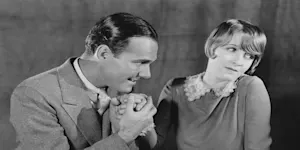What Makes This Word Tick
"Jocose" is a delightful word that carries a playful and humorous vibe. It is often used to describe someone who has a lighthearted, jolly, or joking nature. Imagine a person whose every word and gesture seems wrapped in cheer — that's "jocose"!
If Jocose Were a Person…
If "jocose" were a person, they might be the stand-up comedian at your local club. This person would have a twinkle in their eye and a penchant for bringing a smile to one's face with their witty banter and amusing stories.
How This Word Has Changed Over Time
Since its Middle English days, "jocose" has stayed true to its roots, consistently describing a sense of jest and merriment. While its core meaning remains steadfast, the contexts in which it is used have expanded from folktales to modern stand-up comedy.
Old Sayings and Proverbs That Use Jocose
Though not directly embedded in age-old sayings, "jocose" captures the essence of proverbs that celebrate laughter, such as "laughter is the best medicine." Its spirit is woven into the idea that happiness and humor are timeless remedies.
Surprising Facts About Jocose
The term "jocose" is derived from the Latin word "jocosus," meaning full of jest or joke, showing its noble pedigree. Also, this charming adjective can elegantly alter its form to become "jocosity," a noun referring to the quality of being jocose.
Out and About With This Word
"Jocose" often makes its way into literature, theater, and films, where characters or narratives embrace a comical or lighthearted tone. It's the kind of word that might describe a quirky sitcom character or a playful children's book.
Pop Culture Moments Where Jocose Was Used
While the word "jocose" itself may not headline in pop culture, its influence is felt in everything from comedy sketches on Saturday Night Live to the joyful antics of classic TV characters like Lucy Ricardo or Barney Fife.
The Word in Literature
Authors like P.G. Wodehouse would likely spin yarns peppered with jocosity, creating characters whose humor and whimsy leap off the page. It's in literature where "jocose" finds its coziness, sitting comfortably in a comedic tale.
Moments in History with Jocose
Think of Mark Twain quipping about the Mississippi River or Oscar Wilde wittily observing society; these historic figures embodied the spirit of "jocose" long before it slipped into your average vocabulary lesson.
This Word Around the World
In French, a similar expression of wit might be "jovial," capturing a cheerful disposition. Across cultures, the idea of a jesting or good-humored individual transcends language, reflecting shared values of joy and humor.
Where Does It Come From?
"Jocose" finds its roots in the Latin "jocosus," related to "jocus," meaning joke. This etymological journey takes us through vibrant ages where humor has always found a home in human interaction.
How People Misuse This Word
Some might mistakenly use "jocose" when they mean "jocund" or "jocular." Remember, "jocose" pertains to things intended to provoke laughter, compared to simply being cheerful or merry.
Words It’s Often Confused With
Jocular: Often used interchangeably, but "jocular" refers to something fond of joking.
Jocund: Similar in joyfulness but leans more towards being cheerful than humorous.
Jovial: Typically means good-humored but less explicitly centered on joking.
Additional Synonyms and Antonyms
Synonyms for "jocose" include "humorous," "funny," and "merry." On the opposite side, antonyms like "serious" and "solemn" lack the playful spirit intrinsic to "jocose."
Want to Try It Out in a Sentence?
During the family reunion, Uncle Ben's jocose tales kept everyone entertained, leaving laughter ringing across the backyard.
















